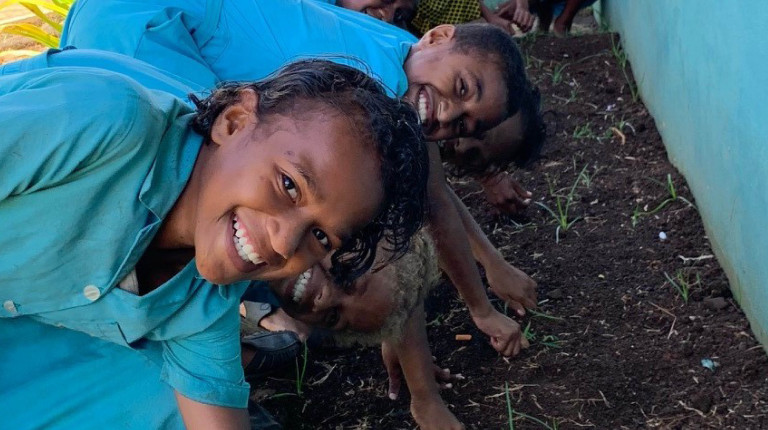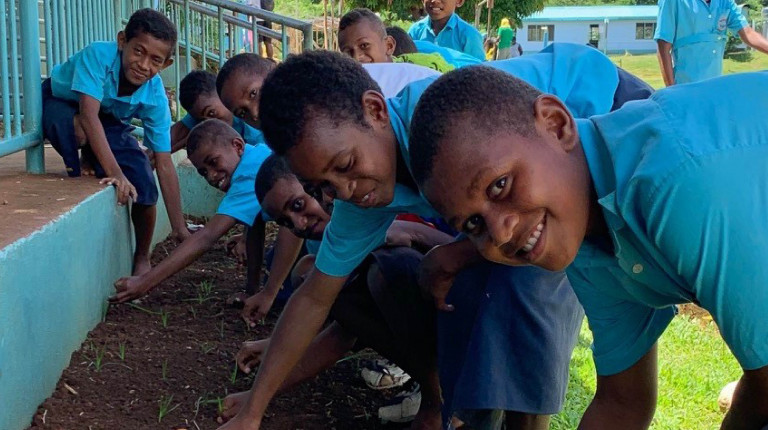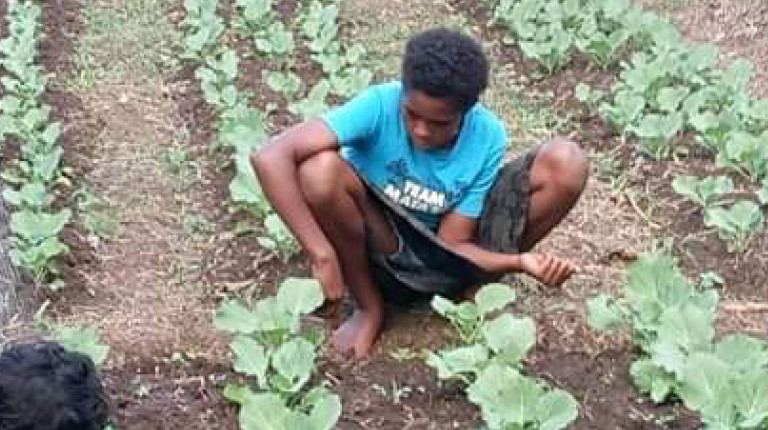For many years we’ve worked alongside our partners Save the Children Fiji to create and deliver life-changing programmes for children and their families. With the support of the New Zealand Government and its Aid Programme, we’ve worked to deliver impactful programmes that help build communities long term.
We’ve collaborated on emergency response and relief for flooding and tropical cyclones and our latest COVID-19 response has delivered grocery packs containing food, baby and hygiene essentials to thousands of vulnerable children and their families impacted by the pandemic.
Supporting Learning
One of our earliest projects – the Mobile Playgroup Project (2002) – began by transporting toys, books and educational materials to children living in the then squatter settlements and slums around Suva. Parents and community leaders were invited to bring their pre-school children together to learn, play and socialise, which led to the creation of the first Early Childhood Development Centre, a permanent place for children to go every day. By the completion of the project in June 2011, the Mobile Playgroup project had established 42 Early Childhood Education centres in poor and informal settlements, of which 10 had received Ministry of Education recognition and were thereby provided with teaching and building grants.
KANA: Building Resilient Communities Safe From Disasters
Fiji has been hit by some of the world’s most serious natural disasters – from tropical cyclones to earthquakes, tsunamis to landslides, fires to health crises, with climate change exacerbating the frequency and intensity of these events. These hazards erode developmental gains, and increase poverty, which makes it more difficult for people to recover after an emergency – creating a vicious cycle of poverty.
In February 2016, Cyclone Winston swept through Fiji, leaving a path of destruction. The storm was estimated to be the worst to ever hit the Pacific, affecting almost 350,000 people – a third of them children.
Our KANA Programme, supported by the New Zealand Aid Programme as one of our Negotiated Partnership Programmes aims to build Resilience through Knowledge and Action in Agriculture and Food Security. Save the Children is working in 20 rural communities and 11 schools in the coastal areas of Ra and Koro islands, with plans to extend into an additional four communities on Koro Island.
Farmers are being trained to cultivate crops that can survive future storms or that grow quickly so they can be sold sooner to earn more money. This all leads to improved health, education and nutrition for children.
As part of the project, farmers are provided with farming tools, cash-crop seedlings, fertilisers, root-crop shoots and herb trees.
Technical expertise provided by Massey University introduces farmers to new farming techniques, sustainable nursery development and financial literacy training.
As well as families benefiting from increased income through the programme, students are also learning about good nutrition by growing fresh fruit and vegetables in school gardens. Parent volunteers then use the produce which is grown to cook lunches which are much healthier than the typical brought-from-home option of fried noodles.
Children participate in nutrition awareness sessions at school and Project Officers visit schools monthly to encourage support from parents and teachers.
Despite Covid 19 restrictions, eight agricultural ‘clusters’ have been established by KANA project staff. This has improved productivity and profitability, enabling farmers to work together to grow a range of crops, boost marketing of crops such as dalo in Koro and vegetables, and promote traditional and new knowledge-sharing.
Community nutrition is being promoted through school gardens, training provided for children and parents, and Food Heroes (children who promote healthy eating in schools and communities).
Seven schools have also established their own nursery beds to germinate seedlings for transplanting to their school gardens.
KANA: Impact
- 1,171 students from 12 schools have participated in nutrition awareness sessions
- 357 people received financial literacy and farming training
- 127 people were trained in disaster risk management through community development committees
- 150 small grants given to support income generating projects like beekeeping
- 33 school gardens established
Preparing Children For Disasters
With climate change increasing the number of natural disasters across the Pacific each year, events like cyclones, tsunamis, floods and drought are having devastating effects on communities. The destruction of homes and livelihoods is common place.
Our Disaster Risk Reduction (DRR) programme, supported by the New Zealand Aid Programme, is working with 30 high risk communities across Fiji to build their resilience and strengthen their response to future events.
We're enabling them to prepare themselves for disasters before they hit, teaching children how to keep themselves safe and ensuring these communities have the means to earn a living following a natural disaster.
"Our school is located in a flood prone area and when the community was affected by floods in 2018 Save the Children came to our rescue and assisted our students with school bag kits. We now have a school disaster management and risk plan in place." Valesio Tamanitokola, Head Teacher, Votua Catholic Primary School
Disaster Reduction
Local Community Disaster Management Committees are actively involved in identifying and improving local hazards, establishing community disaster plans and school safety tools, building up supplies and facilities and running simulation and training exercises.
DRR Child Clubs
Our team in Fiji runs 30 Child Clubs, where children learn about climate change, safety, health, hygiene and the environment.
By actively involving children in an area that is usually the domain of adults, children are empowered to become change makers in their communities.
Securing future livelihoods
With the aim of increasing average household income by 20%, we work with community groups to adapt current livelihoods and develop alternative ones which will safeguard food security and income before, during and after a disaster.
DRR Impact
- 30 target schools have developed disaster management plans.
- 10 communities have developed specific livelihood activities e.g. crab and fish pond farming.
- 30 communities have created hazard and vulnerability maps.
- 60 Hygiene Promotion kits have been purchased and prepositioned in schools for future emergencies.




